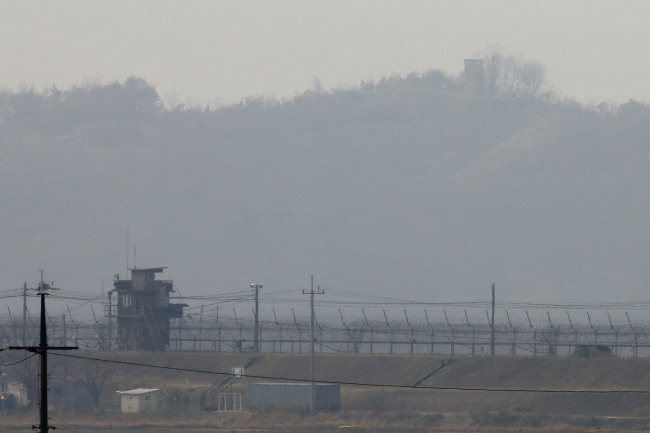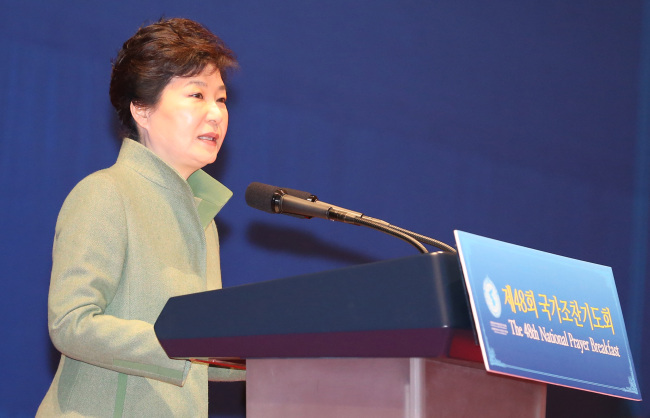North Korea fired several short-range missiles towards the East Sea on Thursday, in apparent protest against the United Nations’ adoption of a series of the harshest-ever sanctions, the Defense Ministry said.
The military provocation also came hours after President Park Geun-hye issued tough remarks against the communist regime, pledging to deter its “tyranny.”
“The North Korean military fired six short-range projectiles from Wonsan, Gangwon Province, at around 10 a.m. today,” ministry spokesperson Moon Sang-gyun said in a press briefing.
“The detailed type of the launched vehicles is currently under examination.”
The projectiles in question, which allegedly fell into the sea after flying some 100-150 kilometers, are suspected to be short-range KN-01 missiles, with or without 300-millimeter-caliber rockets, according to officials.
“The military is on sharp lookout for any further movements by North Korea,” said the Joint Chiefs of Staff in a statement.

The guard posts at the inter-Korean border in Paju, Gyeonggi Province. Yonhap
North Korea’s armed protest -- marking its third this year following the nuclear test on Jan. 6 and long-range missile launch on Feb. 7 -- comes in the wake of the U.N. Security Council’s adoption of a drastic resolution to punish Pyongyang for its defiant actions.
The unanimously approved Resolution 2270 visibly stepped up restrictions on the communist nation, including mandatory inspection of all cargo moving across its borders and bans on its exports of key mineral resources.
The measure, taking direct aim at North Korea’s economy, is expected to have more clout than any of the past resolutions that largely focused on military actions only.
The hard blow also means that the inter-Korean tension will continue to escalate, with the South tightening surveillance on the North‘s military actions and the North lashing back at what it sees as an unwarranted interference.
Seoul has made it clear that it will not soften its stance.
While gearing up for a joint military exercise with the U.S. forces next Monday, the South Korean government has also been growing vocal on condemning the North.
Oh Joon, South Korea’s ambassador to the international organization, in a rare move directly addressed North Korean leader Kim Jong-un right after the resolution passed.
“As a member of the Korean people, I request the North Korean ruler put an end (to nuclear development),” Oh added in Korean at the end of his speech.
“(South) Korea has no nuclear weapons. You have been imagining (military threats) that are nonexistent.”
Seoul, which had been seeking to add pressure upon its hostile neighbor, welcomed the resolution.

President Park Geun-hye speaks Thursday at a breakfast meeting hosted by the Christian Council of Korea. Yonhap
“We will continue to cooperate with the international society so that the North Korean regime may renounce its reckless nuclear development and cease its tyrannical rule,” the president said at breakfast meeting hosted by the Christian Council of Korea.
This is the most direct and vigorous term the South Korean leader has used against the North Korean regime or its ruler Kim Jong-un.
The president’s repeated pledge to apply diplomatic leverage upon the North was backed by a series of restrictive bills passed by the National Assembly late Wednesday.
The list of bills included the antiterrorism bill and the North Korean human rights bill, the former expanding the power of the nation’s spy agency to monitor potential terror suspects and the latter allowing the government to investigate Pyongyang’s human rights abuses.
The Seoul government also remained cautious in its stance on whether to proceed with a trilateral logistics project involving the two Koreas and Russia.
The “Rajin-Khasan logistics project” envisions the delivery of Russian coal into South Korea through the North Korean port city of Rajin. South Korean companies that have joined the project have conducted three test drives since 2014.
Further consultations have been suspended since the Feb. 7 rocket launch.
The South Korean Unification Ministry said it will consider various factors before making the decision. Russia’s foreign ministry said Wednesday that the project would not be affected by the new U.N. sanctions.
By Bae Hyun-jung (tellme@heraldcorp.com)







